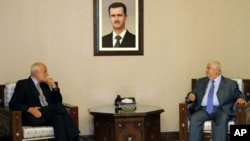Syrian security forces have killed at least 12 civilians in raids on restive northwestern towns as the head of the International Committee of the Red Cross visited Damascus to push for medical care for the wounded and access to detainees.
Rights groups said Sunday that troops cracking down on pro-democracy protesters killed eight people in northern Idlib province and four more in central areas near Hama.
Both regions have seen intensified government operations against people involved in popular unrest since last week's defection of Hama's attorney-general. Authorities are hunting for Judge Adnan Bakkour in the countryside around the flashpoint city.
Also Sunday, the state-run news agency (SANA) reported that armed "terrorist" groups ambushed a bus in central Syria, killing nine people - six soldiers and three civilians.
Meanwhile, ICRC President Jakob Kellenberger met with Foreign Minister Walid al-Moallem Sunday and is scheduled to hold talks with President Bashar al-Assad on Monday.
Earlier, Arab League Secretary-General Nabil Elaraby said Syria agreed to host him for a visit, likely this week. Elaraby said Sunday the Syrian government told him it "welcomes" the trip. He said he will express Arab concerns about the violence that has shaken the country and listen to the opinions of Syrian leaders.
One week ago, Syrian authorities rejected an Arab League statement calling for an end to the violence. The pan-Arab organization - of which Syria is a member - urged Mr. Assad to stop the bloodshed "before it is too late."
The United Nations says more than 2,200 people have been killed during the Syrian crackdown since March, when protesters began calling for reforms and an end to Mr. Assad's autocratic rule. The Syrian government blames the violence on what it calls armed gangs and terrorists backed by foreign conspirators.
Syrian activists reported government forces killed five people Saturday.
Witnesses said government tanks also moved against the town of Telkalakh, near the Lebanese border, and mourners in the Damascus suburb of Douma chanted slogans denouncing the killing of a young protester Friday.
Mr. Assad's crackdown on dissent has drawn international criticism and sanctions. The European Union announced Friday it is banning imports of Syrian oil and petroleum products, which will cost the embattled government millions of dollars each day.
Russian Foreign Minister Sergei Lavrov condemned the EU action, saying unilateral sanctions do no good and destroy partnerships. The United States said the embargo sends a powerful message to Mr. Assad's government to end the violence and allow a peaceful political transition to begin.
Washington has hit more than 30 Syrian officials, including Mr. Assad himself, with economic sanctions, banned any U.S. import of Syrian oil and frozen all Syrian government assets subject to American jurisdiction. But the U.S. has isolated Syria for decades and has little leverage with the government - unlike the EU.
Some information for this report was provided by AP, AFP and Reuters.




